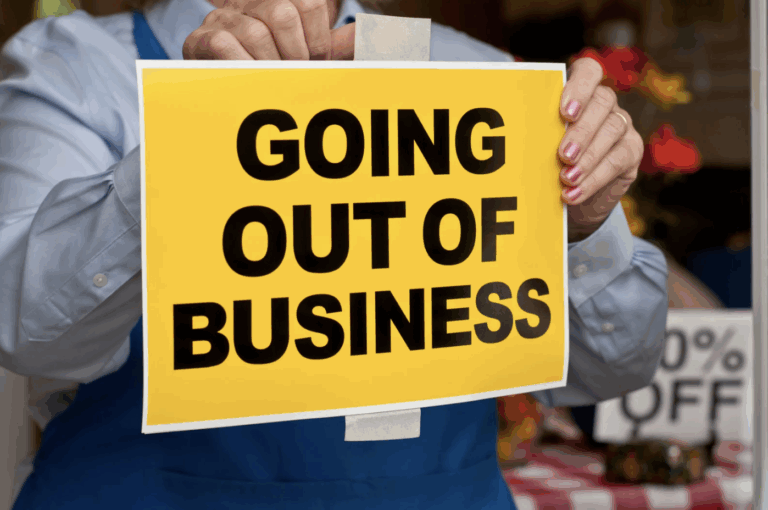As a small business owner, sometimes taking on debt is necessary to grow your business. However, you don’t want to accumulate too much debt, or take on certain types of high-interest debt that could actually harm your business. Otherwise, your cash flow and revenue—and ultimately the business itself—can suffer.
If you’re interested in reducing your existing business debt, there are a number of strategies you can use. The right move for you will depend on the specific situation and variable factors related to industry and type of debt. Read on to learn how to get out of business debt and have more cash available.
What Happens if You Don’t Pay Business Debt?
If you’re drowning in business debt, like MCA debt, you may be tempted to ignore it. But failing to repay debts can have serious consequences for your business and personal finances.
For one, missing payments on a business credit card or loan can damage your personal credit score, especially if you personally guaranteed the repayment of the debt. Bad credit can make it difficult to obtain financing or credit in the future, for both you and the business. If you continue to let your debt go unpaid, it can be sent to collections or a collections attorney who will then prepare to sue you and your business. That means getting calls, letters, and messages from collection agencies demanding payment and threatening to come after you. Creditors may also reach out to your vendors and customers in an attempt to get paid.
Defaulting on business debt means you’ve breached your contract with the lender. At that point, they can take additional steps to collect the debt. For instance, if the debt is secured by collateral such as equipment or commercial real estate, the lender[1] may be able to seize those assets to recoup their losses. They may also take legal action and sue you in court. This is not only costly in terms of legal fees, but you could end up having your bank accounts frozen, assets liquidated, and more if you lose the case.
With some types of business financing, such as merchant cash advances (MCAs), your contract may contain aConfession of Judgment (COJ). This allows the creditor to file a lawsuit and obtain a judgment against your business without going through the regular lawsuit process or giving you the opportunity to represent yourself in court.
In short, not making your business debt payments can have serious repercussions. So it’s important to make every effort to pay your debts on time and in full to avoid these consequences.
Am I Personally Liable for Business Debts?
Generally, your personal finances should be kept separate from your business. That said, in certain circumstances, you can be personally liable for business debt.
For example, if you operate as a sole proprietorship or a partnership, you are likely personally liable for all of the business’s debts. Other business structures, such as a limited liability company (LLC) or a corporation, may have more protections in place. But there are exceptions to this rule.
For instance, you may have signed a personal guarantee on a business debt. This is a common requirement for MCAs and certain types of small business loans or lines of credit. A personal guarantee means you are responsible for paying back the debt if the business cannot.
It’s best to check the agreements you signed to see if you are personally liable for the debt of the business. You don’t have to be an owner either; in some instances employees can also be responsible for certain types of business debt, including credit card debt.
How Much Debt Is Normal for a Business?
The amount of debt that is considered “normal” for a business depends on various factors. It depends on the size and type of the business, the industry, its revenue, profitability, and growth goals.
In general, businesses can have different levels of debt based on their capital structure and financial strategy. It’s common for businesses to have some level of debt to finance their operations, investments, or expansions. However, carrying too much debt can be risky and may negatively impact the business’s financial health and creditworthiness.
To determine the appropriate level of debt for your business, several financial ratios and metrics can be analyzed, such as debt-to-equity ratio, debt service coverage ratio, interest coverage ratio, and leverage ratio. These ratios compare the amount of debt to equity, cash flow, assets, and earnings of the business to assess its ability to repay its debts and manage its financial risks.
As a rule of thumb, many experts suggest that businesses should aim to keep their debt-to-equity ratio below 2:1, meaning they have twice as much equity as debt. However, this may vary depending on the industry and the business’s risk tolerance.
How to Get Out of Business Debt
If you want to reduce the amount of business debt you owe, there are several strategies you can use. Here are some of the most common options.
1. Look for Ways to Cut Costs
If you have a handle on your debt but would like to pay it down faster, the first step you should take is looking for ways to cut existing expenses. Analyze your expenses and identify areas where you can reduce costs, such as renegotiating contracts, reducing inventory, or consolidating suppliers. This can free up extra cash to pay down debt more aggressively and reduce the need for additional borrowing.
It’s also important to know your cash flow, and budget regularly so you can understand what bills are due and what monies are coming in. Without knowing, you won’t be able to determine where and how you need to cut expenses in the first place.
2. Increase Your Revenue
Aside from cutting expenses, you can also explore ways to increase your sales or revenue. That might include expanding your customer base, improving your marketing, or launching new products or services and easily bill-pay programs. This can help you generate more cash flow to pay off your debt.
3. Restructure Your Debt
If you’re struggling to make payments, you may be able to negotiate with your creditors to restructure your business loan terms. That might involve extending your repayment term, lowering the interest rate, or pausing payments temporarily.
In some cases, your contract may include such a provision to restructure payment terms if you face financial hardship. MCAs agreements, for example, are often legally required to have a reconciliation clause, which means the provider must work with you on restructuring the debt and coming up with a new payment plan if you don’t have the means to make payments currently. MCA debt can be one of the hardest to deal with since the terms are often beyond the business’s ability to pay.
4. Take Out a Consolidation Loan
If you have good credit, you may qualify for a low-interest installment loan that can be used to consolidate and refinance your debt (ideally, at a lower interest rate and/or monthly payment). Fr example, you may be able to get a low-cost loan through the SBA. Debt consolidation also means that you have a single monthly payment with a fixed interest rate to manage, instead of multiple loan payments and terms. This has to be done carefully and with an expert in debt resolution to ensure the success and limitation of business liability exposure to creditors.
5. Negotiate a Settlement
For borrowers who are far behind on payments and have no reasonable means of paying back their debt, negotiating a settlement may be the best course of action. This involves working out a deal with the creditor to pay a fraction of what’s owed, and in exchange, the account will be considered paid and closed.
Most creditors won’t consider a settlement unless it’s clear that you won’t be able to pay them back in full, or that your business sales have declined to the point you may declare bankruptcy. A settlement allows them to recoup a portion of the debt rather than nothing at all, while avoiding the time and resources required to pursue a lawsuit.
Additionally, it’s a good idea to enlist the help of an experienced debt settlement attorney who can guide you through the ins and outs of creditor-debtor law and the debt settlement experience. They can often negotiate on your behalf so you can focus on running your business. Plus, an experienced debt relief lawyer can ensure you receive the best deal possible for your financial situation and protect you legally and financially.
6. Seek Legal Help
Regardless of which option you pursue, it’s important to act before the situation gets worse. A debt relief lawyer can review the details of your business debt and provide legal advice on how to proceed. They’ll come up with the best strategy to resolve the debt, protect your credit, and get you to the other side where your business can thrive. Additionally, if you are facing a lawsuit or other legal action from a debt, a debt help lawyer can represent you in court against the creditor’s attorney so your legal rights are protected.
Tayne Law Group is an award-winning firm that has been helping clients with business debt relief for more than 20 years. Call us today for a free, no-obligation phone consultation at (866) 890-7337 or fill out our short contact form. We never share or sell your information and all conversations are confidential. We help clients all over the country with debt-related questions and concerns.





